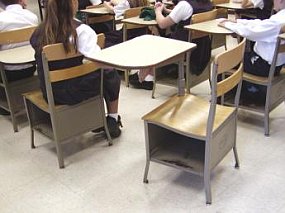Google myths of homeschooling and invariably you get a page defending homeschooling. What you never get is an analysis of the hype that surrounds this most divisive of topics.
At the risk of being shunned, scolded, and potentially stoned to death by an angry mob of Basic Youth Conflicts graduates, I want to talk about the homeschooling craze and the tsunami of myths it perpetuates.  Anyone who desires to cut through the homeschooling hype is subject to punishment, as if the act of homeschooling is above question. Yet all kinds of learning exist; homeschooling is just one option in a sea of possibilities.
Anyone who desires to cut through the homeschooling hype is subject to punishment, as if the act of homeschooling is above question. Yet all kinds of learning exist; homeschooling is just one option in a sea of possibilities.
Before I go on, I’d like to discuss my background. My degree is in Christian Education from Wheaton College. I’ve vigorously studied curricula used in homeschooling, so I know the content. I’m also, as most people reading this are, a product of the public school system. My mother was a public kindergarten and preschool teacher for many years and was anti-homeschooling. Despite this, she was an outstanding educator and a mother admired not only by her kids, but also by other mothers. As for my wife and I, we homeschooled our son for a time because of my background and his needs. So this is not a diatribe against all homeschooling or else I’d be a hypocrite.
My hope for this series is to slice through the rhetoric that surrounds homeschooling and to honestly examine its strengths and weaknesses. This is a touchy subject loaded with potential landmines, but homeschooling has its troubling issues and few Christians examine them honestly. Instead, many Christian families are swept along by the homeschooling tsunami unable to clearly consider all its issues.
Let’s take a look at the first few myths:
Myth #1: If you don’t homeschool your kids, you’re not a good parent
We say it’s all about the children, but hasn’t homeschooling become a criterium for sorting the good parents from the bad? Have we not made it a source of pride for those who do homeschool, using homeschooling as a litmus test for labeling others?
No myth does more to generate a class structure within churches than this one. Too many adults classify each other based on whether they homeschool or not. Worse, many Christian organizations insist that to be a good parent, you must homeschool.
Behind this mistaken notion lies numerous problems. On a basic level, our 21st century societal structures don’t support homeschooling. The work lives of the majority of Americans differ dramatically from those of adults at the time of this nation’s founding, when most children received their educations at home. In those pre-industrial days, both parents worked from home and America was largely agrarian. Both parents equally taught their children, not just one homeschooling parent, as is common today.
Sadly, few people question contemporary work situations that take at least one of the parents out of the home all day. By all standards, particularly biblical ones, having only one parent involved in the schooling of children is a defective method at its core, yet it is held out as the ideal today. The stress of forcing all schooling onto one parent is too much for most people to handle, yet many homeschooling parents labor under the pressure to conform to that defective standard, forced to grin and bear the responsibility like a good soldier.
But homeschooling is not meant to be a lesson in endurance. I suspect that many homeschooling moms—if allowed to vent their true feelings on the issue apart from the pressure they feel to conform to a homeschooling ideal—would say the stress and pressure to teach and run a household without the aid of a spouse at home most of the day is overpowering. Trying to jam the responsibility of two adults into one is more than many can bear, yet they shuffle on lest someone accuse them of not being a good parent because they no longer homeschool.
Homeschooling is harder than most people think. Curiously, the Christian organizations that trumpet homeschooling provide no coping methods or assistance for Christian families who seek to have both parents at home—the ideal homeschooling environment—rather than just one. Little is said about the work environments that exist today that take one of the parents out of the home for most of the day while the other struggles to manage all the requirements of keeping a household running while homeschooling.
Homeschooling is not about guilt, yet many adults who cannot homeschool—or those who do and are buried under the load it entails—feel guilty all the time. It’s time we Christians made life easier for both homeschooling and nonhomeschooling parents by dropping the “you’re a bad parent if you don’t homeschool” rhetoric we wield like a club. Many families are struggling and to judge any family by whether it homeschools or not is not of God.
Myth #2: Homeschooling more actively involves parents in their children’s educations
There’s a dirty little secret behind much of homeschooling. I know folks who insist what follows is not them, but my experience proves otherwise.
We all know homeschooling parents who brag about the fact that their kids don’t watch TV or that they don’t even have a TV in the house. Yet how curious that so many of these same parents see no problem with placing a child in front of a computer for hours on end doing computerized homeschool curricula. Many parents can’t draw a distinction between three hours of spurious TV viewing and the three hours their kids spend each day glued to some video-driven homeschool curricula, either. That hypocrisy is perfectly understandable given the ridiculously high regard we give homeschooling. We give parents kudos for homeschooling regardless of how well they actually teach.
From my perspective, a kid wedded to a computer or TV for hours on end is not getting a more parent-driven education than a child who sits in a public school classroom. We’re deceiving ourselves if we believe this myth. Worse yet, the parents who howl about public school content rarely take the time to review the homeschool computer or video content their kid is inhaling for hours on end.
Let’s be honest here. Computer or TV-based homeschooling courses are as much a babysitter as is commercial TV or the public school teacher. A harried mom can sit Junior down in front of a video on fractions then attend to scrubbing the kitchen floor. I understand how hard homeschooling is, but it’s the dishonesty that attends this issue that bothers me. Use the computer and TV-based curriculm, but understand it for what it is. And don’t hide behind the aura of homeschooling if what you’re doing is plopping your kids in front of curricula run from a DVD, videotape, or computer.
Myth #3: The educational methodology behind most homeschooling curriculum is superior to the methodology used in public schools
B.F. Skinner is the psychological theorist behind behaviorism and operant conditioning. We’ve all seen rats trained to press a lever to receive a reward of food or electrical brain stimulation. Ever since Skinner debuted his educational theories in the ’40s and ’50s, Christians have decried behaviorism as dehumanizing brainwashing. Firmly rooted in a naturalistic, Darwinian worldview, reviled as anti-God, pro-Communist, and secular humanism at work, behaviorism is the educational methodology Christians most oppose.
Unbelievably, the majority of Christian homeschool curricula are based on behavioristic teaching methods. Even more ironic, public schools have moved away from behaviorism while Christians have castigated them for doing so.
When I first examined this problem back in the early 1990s, the three most popular Christian homeschool curricula were Skinnerian to the core. Since that time, other methodologies have arisen, but behavioral teaching methods still predominate.
“Unschooling” is growing within some Christian circles, but it is based on the theories of Jean-Jacques Rousseau as expressed in his book Emile. It’s surprising that Christian homeschooling parents would want to follow the ideas of Rousseau, an anti-family scoundrel if there ever was one, but such is the reality of our modern educational methods that it’s hard to turn anywhere without finding a problematic theorist behind any learning method.
Dozens of educational methodologies exist to confound homeschooling parents today. All have blind spots and problems. Some are better than others and a mix of them might be the best option of all. And as for one, the classical education, I will save some insights on it for later.
Stayed tuned for more in this look at the myths of homeschooling as I tackle the issues of what constitutes an appropriate education today, how Christians are ignoring changes in our culture, and how that must alter our educational content, and more.
***
This four-part series:

 what shocked me was that so few people were even willing to consider for a brief moment that what Falwell said might be true.
what shocked me was that so few people were even willing to consider for a brief moment that what Falwell said might be true. When they learned we would be moving away, Michael and Linda sent us off by taking their time to make us Cincinnati-style chili from scratch. Nice touch.
When they learned we would be moving away, Michael and Linda sent us off by taking their time to make us Cincinnati-style chili from scratch. Nice touch.